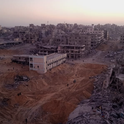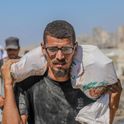It was a weekend of horrors. On Saturday 27th July, day 295 of the war in Gaza, the Israeli army struck a school in Deir al Balah in the central Gaza Strip. Thirty people were killed, many of them children. That same day, 12 children and teenagers were killed while playing football when a rocket hit Majdal Shams. The town is predominantly home to the Druze, an Arabic-speaking religious minority, and is located in the Golan Heights, an area occupied by Israel in the 1967 Six Day War. Many more were wounded in both incidents.
Israel blamed Hezbollah for the Majdal Shams tragedy, claiming the Shia militia had fired a Falaq-1 Iranian rocket from across the border in Lebanon, which Hezbollah denied. And Israel justified attacking the Khadija school with the claim that Hamas was using it as a “command and control centre”.
So many young people died that day, in a war that should have ended months ago but which continues, and with it the further entrenchment of fixed positions. It should be easy to agree that no innocent civilian, certainly no child, should die such a cruel and unnecessary death. Yet even footage of body parts strewn across a football pitch, or of children, bleeding, being carried through the rubble, does little to soften hardened hearts.
As images and video of Majdal Shams began to circulate, the responses online rhymed with those seen ever since the 7th October, the day of Hamas’ attack on southern Israel. On 27th July, some social media users were calling, like Israel’s most right-wing politicians, for retaliation—for Beirut, the Lebanese capital, to burn.
This time around, initially some on parts of the left cheered what appeared a successful Hezbollah strike on Israel. These reactions were “predictably polarised and dehumanising”, says the scholar Monica Marks, with “supporters of Netanyahu” justifying “military reprisals” and “apologists for Hezbollah rushing to deflect or deny as soon as news broke that the victims were Arab and children”.
The same patterns repeat themselves. There is “cheerleading and denialism on the ‘resistance’ side, played out alongside justifications for collective punishment and a continuation of the cycle of violence on the Israeli side”, adds Marks. As more families start the lonely work of grief, too many people following online refuse to recognise that both the deaths of Palestinian children in Gaza and the deaths of Druze children in the Golan Heights are indefensible.
At the same time, the news is awash with political and diplomatic interventions—that familiar choreography of war. On Saturday, Israel’s foreign minister Israel Katz said Hezbollah had “crossed all red lines” and that Israel was “approaching a moment of all-out war against Hezbollah and Lebanon”. Overnight on Sunday the Israeli Air Force struck Lebanon, and the Israeli war cabinet authorised Israel’s prime minister Benjamin Netanyahu and his defence minister to order a further response to the Majdal Shams attack. The Americans and the UN urged restraint. Lebanon’s foreign minister told Reuters that he had asked the US to urge Israel to show restraint, and that the Americans had asked him to do the same with Hezbollah. Turkey’s President Erdogan added to the sabre-rattling, seeming to imply that Turkey would “enter Israel” to help the Palestinians. By Monday, anonymous Israeli officials were telling Reuters the country wants to avoid Katz’s promised “all-out war”.
The only option, the only opinions, are those we already know and have, the ones we are already comfortable with. The chilling truth is that these ten months have eroded empathy just as they have exposed political leaders’ lack of imagination. The only option is more war, more retaliation, but not so much as to tip the balance into total carnage. But what does that say about the violence the world has tolerated in Gaza?
Our debased internet discourse flattens everything: satire, empathy and recognition of each other’s humanity. And its effects are not confined to the internet. On Sunday, Israeli media reported that Netanyahu had delayed the departure of 150 sick children in Gaza who had been due to fly to the UAE for medical treatment on Monday, apparently for fear of a reaction from his right-wing voter base.
There are no limits to cruelty, nor to the extremes to which revenge and wanton violence can push human beings. On Monday, two military bases were stormed by protestors, settlers and extreme right-wing Israeli politicians, encouraged by Israel’s national security minister Itamar Ben-Gvir, after military police arrived to arrest soldiers on suspicion of sexually abusing a Palestinian detainee. For hours anarchy reigned. The Israeli army seemed powerless against this mob, which was trying to protect soldiers accused of the worst abuses.
“This is campism,” says Marks, describing an instinctive retreat into support for one side no matter what. “But it’s campism borne of a conflict that has lasted so long and created so much pain that resentments, deflection mechanisms and dehumanising response patterns have become reflexively ingrained, to a degree that feels, to many people, impossible to overcome.” Among those following the carnage on social media, too few are saying clearly what must not be forgotten: that every innocent killed in this war is a tragedy. None deserved the unimaginative, cowardly leadership that has led them to this dead end.













